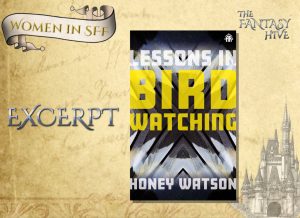LESSONS IN BIRDWATCHING by Honey Watson (EXCERPT)
During their temporary research post on Apech-a planet ravaged by a time distorting illness-Wilhelmina Ming and four other elite students of the Crysthian empire have witnessed such illogical brutality that they’ve resorted to psychedelic antidepressants and group sex to take the edge off. After a night of indulgence following a gruesome execution, they wake to find an oblique warning in the form of an impaled corpse dangling from the exterior of their residence.
When their subsequent investigation uncovers a web of collusion and conspiracy in the ranks of their own diplomatic corps, the envoys find themselves caught in the middle of a bloody civil war. As bodies pile up above ground, a deranged fanatic stokes an existential threat below, coaxing the embers of a forgotten god, and its temporal virus, to life.
Lessons in Birdwatching is due for publication on 8th August from Angry Robot.
You can pre-order your copy on Bookshop.org
Lessons In Bird Watching
by Honey Watson
Chapter XXI
Here’s how the city feels.
They’re like this, cities, all cities – even this false one. Something glimmers around them in the not-quite-enchanted, not-quite-mundane sense of an external temperament; an invisible, palpable and unavoidable consciousness rests on top of them all. Lon Apech is tense. The only ones here who cannot feel this are the outsiders, those whose ignorance perforates the fog in self-indulged vacuums. Peter is not one of these strangers; his motion flows into the mist of the city and he is boldened by it, watched by its people who have gathered in that unspoken way crowds have of milling around themselves, making the individual feel better and the situation feel worse. Clutches of them here and there, with different moods and different causes, but all of them waiting; knowing they need to be together when it happens. Ready to respond, to help, or to hide. The people of Lon Apech know what is happening in their city, the still war between two opposing factions. They have their allegiances and their opinions even if they would not risk their lives for either; but now they can feel the other thing, too.
Most if not all of them are too young to remember the god at its full power. This is wrong, anyway. It has never had full power because those to whom it was beloved had never had a cause other than its pleasure. They do, now. Unity, strength, escape. Their plans will feed it even as it destroys them. It can do that. It is strengthened, even though such a word could never really be applied to something like this.
The people of Lon Apech can feel it growing, as if it is searching over them. It is. Their vision is blurring. It shows them futures and movements and motions. Things that could have happened, infinite pasts flickering into now. They do not know whether they can trust it. Some are growing to love it already, testing the movement of their arms and fists. They experiment with their new power; play-fighting, throwing reality at each other, knowing exactly how to move in such a way as to appear to defy gravity, knowing the future and how to resist it. They should not trust these things, because they do not know what it is. But it is with them, for now, seeming for all the world to enjoy their games as they roll and writhe against the visions it provides them. We see ourselves as separate, individual pieces; that’s another problem. All these tiny futures broken – a deadly fall avoided, a punch landed, a kick here – are as nothing to the sequence it sees. An unimaginable map, a structure of giant lines and vectors and rules. It is these which the god bristles against; we only help.
It is a thing inexplicable, flesh coupled with something like knowledge or divinity. It is because of our similarity that it can use us, although use implies intentionality.
There is a place where the city is at its most fraught. Dozens of people sitting on meticulously raked gravel, staring at the pattern in the grit as the god makes it ebb and flow unreal, impossible before their eyes; all the patterns it will be or has ever been at the same time. It is a form of meditation, for them, to watch the sand and concentrate and to fight off the visions. To force it to be still. They are beginning to lose. The god has found its enemies.
They stare at the patterns. Pick up a rake, change it here and there. Sit down to stare.
Peter broke their concentration with the ringing echo of metal knocking against metal, the barrel of his ridiculous gun striking the door.

